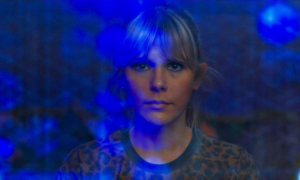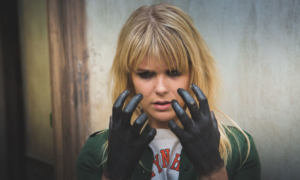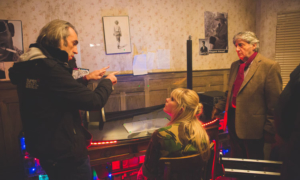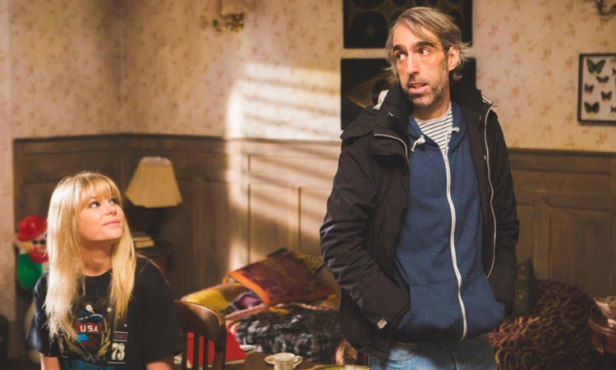Directed by Paul Hyett, Peripheral follows young literary sensation Bobbi Johnson (Hannah Arterton) who is convinced that a new smart editing software her publisher has forced on her is controlling her and her writing. In fact, she soon realises she may be a pawn in a conspiracy of social mind control. However, being too far down the rabbit hole to turn back, Bobbi must keep writing, fighting her own addictions and hallucinations as she rushes to beat her deadline without selling her soul in the process.
With a focus on new technology, writer’s block and addiction, Peripheral is a dark sci-fi horror that isn’t afraid to tackle some difficult themes. We speak to Paul Hyett about the film and why its release is so timely.
How did you get involved in the project?
The producer Craig Touhy and I had a meeting. We had tried to get a project going together for a while. He pitched the idea for Peripheral. At the time I wasn’t sure. I had just done Howl and that was a bigger, more challenging project than The Seasoning House and I wanted to continue doing bigger, SFX laden movies. But Craig asked me to read the script. So I did, and I said yes the next day!
What attracted you to the Peripheral script?
I really was sold on the artist’s struggle as well as the very relevant comment on today’s obsession with celebrity status and also the scary AI computer. In a time when as artists and writers you’re being continually pushed to mould your script to work within a certain demographic, to be family-friendly, easy to sell, not too challenging or controversial. And the thought of a computer that writes with you, in real-time, changing your work by an algorithm, then it’s sent to the publisher, it was a horrifying concept. An end to the independent vision of an artist. Also, I was at a point where I was struggling to get a script right, I was under pressure to write for what works for someone else. So Bobbi’s struggle was very relatable.
How would you describe Peripheral?
A haunting, hallucinogenic nightmare journey into the mind and soul of the struggling artist.

Would you say that Peripheral’s release is very timely?
Yes very much so. Even more timely than when we shot it. Everything from the celebrity obsession to the streaming giants really becoming king in this lockdown. Their algorithms choosing what they want us to see. And the constant pressure on writers to write within confines of what is popular on those streaming sites. Also now, more than ever, people are dependent on technology. Ordering food, books and movies online, working from home, zoom calls replacing conferences… it’s all tech-based. So much reliance. Also, during the Covid-19 lockdown, I feel like Bobbi every day now. I think people will really relate to the claustrophobia, the feeling of being stuck in your house with just technology for company.
The protagonist of Bobbi Johnson is very complex and she is largely on her own in the movie – how closely did you work with actress Hannah Arterton on characterisation?
Hannah and I spoke a lot about Bobbi. I was really happy to cast Hannah. We’d both worked together before and we know each other really well. We have a short-hand. She can read me like a book, if there’s something I don’t like she’ll pick it up. And every day we would have discussions on the emotional beats of Bobbi, her character arc. We only had four weeks to shoot the movie, we had to be on the same page, with no egos, and just a focus on the story and characters. It was a pure pleasure working with her and she played Bobbi so perfectly, better than I could have ever imagined.
Peripheral mainly takes place in one flat – did you shoot in one location and what were the logistics like for that?
Early on when we were discussing the logistics for the flat, I really pressed to be able to film on a set. We built that entire flat in an abandoned school somewhere in Watford. To be that creative with the camera, we needed to be able to float walls in and out. If I needed something drilling, cutting etc. I could request and the next day it’s done. There was plenty of space for the crew. I’ve shot in real locations, houses etc before, it’s fine for a day or two, but not for a whole shoot.
You’ve worked on a lot of horror and science fiction projects – what is it about genre that attracts you?
Ever since I was a kid I was brought up with horror and sci-fi. In my early teens it was all Robocop, Total Recall, Nightmare On Elm Street, Friday The 13th – all the cool slasher movies. And I think the main draw of those movies are pure fantasy and escapism. For two hours you’re transported into another world. All your current problems as well as the world’s problems are forgotten. I think there’s something in horror and sci-fi that transports you more than say a romantic comedy or a drama.

What were your inspirations behind the look of the film?
I knew having a movie set in one flat, essentially a room, that visually I would have to make sure it wasn’t flat, I had to keep the audience visually entertained as the eye can get bored from the same imagery, the same location. I had wanted to do a hallucinogenic type, Cronenberg-esque mindfuck movie. So I thought considering the content of the movie, this was my chance. Inspired by the work of Gasper Noe and David Cronenberg mostly. Two amazing visionaries.
You’ve worked in various roles of the filmmaking process – from makeup, to visual effects, to acting, to writing, to directing – do you have a favourite role?
Oh by far directing. There’s something about directing, visually bringing your film to life, on set, watching the actors speaking dialogue you wrote, watching a scene you had in your head play out in front of you, it’s a very humbling feeling, something you don’t get from anything else. Makeup was a fun job for 20 years, but you’re supplanting someone else’s vision, and being a commercial artist, no matter how much you press a director towards a look you want, it really comes down to their taste, and sometimes you just have to shut up and do whatever they want. So with directing, you tend to do what you want, it’s all down to your vision and no one else’s. Which also has the flip side that you get blamed if it gets bad reviews or doesn’t do good box office.

What’s coming up next for you?
I have two projects, one is with Grimmfest films, which is The Black Site, a psychological horror – imagine Zero Dark Thirty meets Jacob’s Ladder. The second is with Washahore Productions – Unnatural Selection. Set in a sleepy Cape Cod town, it’s an atmospheric Carpenter-esque New England horror story.
Peripheral is set to be digitally released in the UK courtesy of Blue Finch Films on 3 August, available on iTunes, Amazon, Google, Sky and Virgin.
